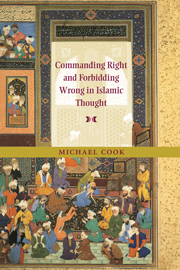Crossref Citations
This Book has been
cited by the following publications. This list is generated based on data provided by Crossref.
El Fadl, Khaled Abou
2001.
Rebellion and Violence in Islamic Law.
Eickelman, Dale F.
and
Salvatore, Armando
2006.
Public Islam and the common good.
Etnografica,
p.
97.
Pandolfo, Stefania
2007.
`The burning'.
Anthropological Theory,
Vol. 7,
Issue. 3,
p.
329.
Marsden, Magnus
2007.
Islam, political authority and emotion in northern Pakistan.
Contributions to Indian Sociology,
Vol. 41,
Issue. 1,
p.
41.
Ghazzal, Zouhair
2007.
The grammars of adjudication.
p.
711.
Bori, Caterina
2007.
Théologie politique et Islam à propos d’Ibn Taymiyya (m. 728/1328) et du sultanat mamelouk.
Revue de l'histoire des religions,
p.
5.
Bonnefoy, Laurent
2008.
Les identités religieuses contemporaines au Yémen : convergence, résistances et instrumentalisations.
Revue des mondes musulmans et de la Méditerranée,
p.
199.
Staëvel, Jean-Pierre Van
2008.
Mercedes Garcı́a-Arenal. Messianism and puritanical reform:Mahdîs of the Muslim west. Leyde/Boston, Brill, 2006, 391 p..
Annales. Histoire, Sciences Sociales,
Vol. 63,
Issue. 1,
p.
194.
Kelsay, John
2009.
James Turner Johnson, Just War Tradition, and Forms of Practical Reasoning.
Journal of Military Ethics,
Vol. 8,
Issue. 3,
p.
179.
Riexinger, Martin
2009.
Islamfeindlichkeit.
p.
457.
Hasan, Noorhaidi
2009.
The making of public Islam: piety, agency, and commodification on the landscape of the Indonesian public sphere.
Contemporary Islam,
Vol. 3,
Issue. 3,
p.
229.
Riexinger, Martin
2010.
Islamfeindlichkeit.
p.
471.
Renterghem, Vanessa Van
2010.
Identifier et s’identifier dans les milieux lettrés bagdadiens(ve-vie/.
Revue des mondes musulmans et de la Méditerranée,
Belal, Youssef
2011.
Le cheikh et le calife.
p.
321.
Faroqhi, Suraiya N.
and
Fleet, Kate
2012.
The Cambridge History of Turkey.
Kaddor, Lamya
2012.
Verhärtete Fronten.
p.
149.
Bangstad, Sindre
and
Linge, Marius
2013.
IslamNet – puritansk salafisme i Norge.
Kirke og Kultur,
Vol. 118,
Issue. 3,
p.
254.
Moutafidou, Ariadni
2013.
Giovanni di Niccolò Pappaffy: identities and philanthropies of an Ottoman Greek broker in Malta.
Mediterranean Historical Review,
Vol. 28,
Issue. 2,
p.
191.
Farina, Marianne
2014.
Engaging the Other.
p.
43.
Black, Antony
2014.
The Cambridge History of Medieval Philosophy 2 Volume Set.
p.
539.





